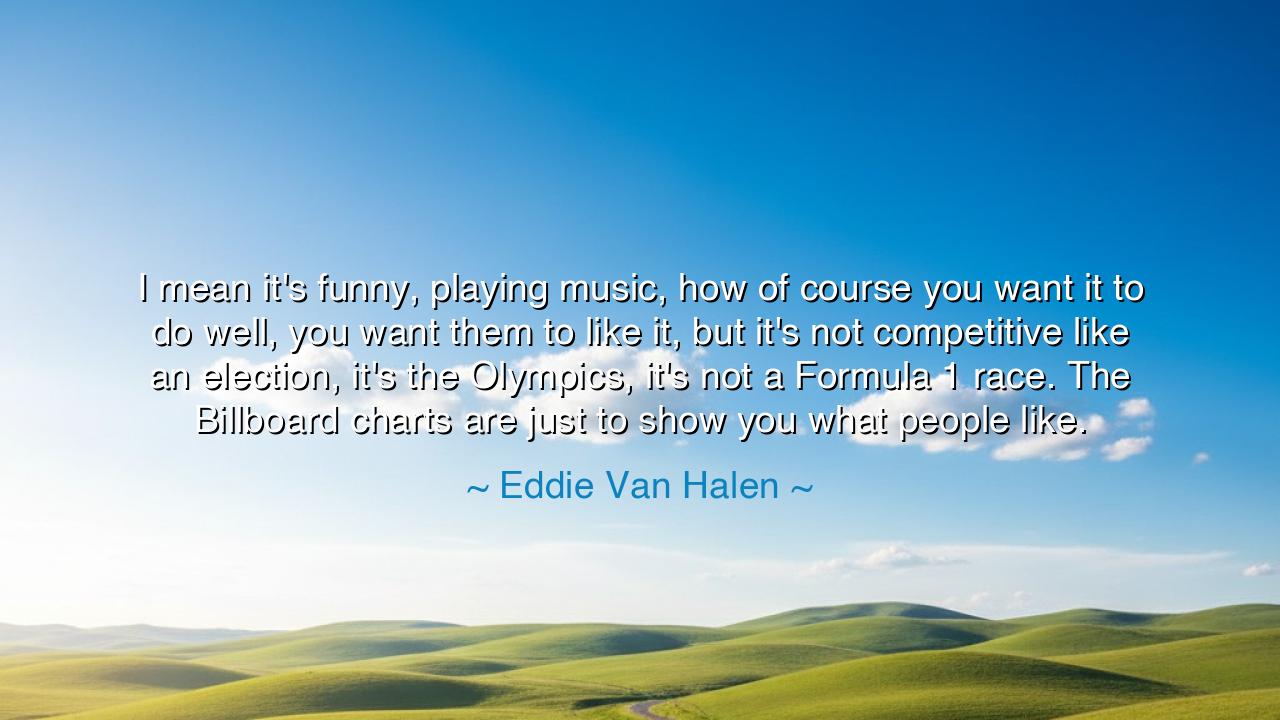
I mean it's funny, playing music, how of course you want it to do
I mean it's funny, playing music, how of course you want it to do well, you want them to like it, but it's not competitive like an election, it's the Olympics, it's not a Formula 1 race. The Billboard charts are just to show you what people like.






Hear, O seekers of craft and harmony, the words of Eddie Van Halen, the master of the six-string flame, who once said: “I mean it’s funny, playing music, how of course you want it to do well, you want them to like it, but it’s not competitive like an election, it’s the Olympics, it’s not a Formula 1 race. The Billboard charts are just to show you what people like.” At first, his words may seem casual, spoken with the easy tone of a man long at peace with his art. But within them lies a deep and noble wisdom about creation, competition, and the purpose of mastery. For Van Halen speaks not merely as a musician, but as one who has seen both the glory and the emptiness of fame—and learned to distinguish between the two.
He begins with a simple truth: that every artist, no matter how humble, desires to be loved. “You want them to like it,” he admits, for this longing is not vanity but connection. Music, after all, is a bridge between souls, a conversation without words. Yet Van Halen reminds us that while success and appreciation are sweet, they are not the true measure of worth. He compares music not to an election, where one must defeat others to rise, nor to a Formula 1 race, where speed alone defines victory, but to the Olympics—that ancient celebration of skill, dedication, and spirit. In this, he reveals his creed: that art is not about defeating others, but about surpassing oneself.
The Olympics of the ancients were not only contests of strength—they were offerings to the gods, acts of devotion to the divine potential within humankind. Each athlete sought excellence, or arete, not to humiliate others, but to honor the sacred fire of effort and mastery. So too, says Van Halen, should be the musician’s path. When you create, do not look sideways to compare, but upward—to reach for something beyond yourself. The Billboard charts, those modern monuments of popularity, may tell you what people enjoy, but they cannot measure passion, innovation, or soul. They show what is liked, not what is eternal.
Consider the story of Beethoven, who, in his later years, was deaf—cut off from the very world of sound that had once defined him. The applause of audiences, the reviews of critics, the fame of peers—all became silent. And yet, in that silence, he composed his greatest works—the Ninth Symphony, the late quartets—music not for charts, nor for praise, but for truth itself. In that stillness, he transcended competition, creating not as a racer but as an Olympian of spirit. Like Van Halen, he understood that greatness does not come from comparison, but from communion with one’s own soul.
Eddie Van Halen’s words also reflect the humility of a true master. Though celebrated as one of the greatest guitarists of his age, he saw his art not as a battle for glory, but as a shared celebration. When he played, he invited others into joy; his music was not a weapon, but a gift. In his eyes, to compete for dominance in art was foolish, for art thrives in freedom, not rivalry. “It’s funny,” he says, as if amused by the idea that creativity could be reduced to numbers. The Billboard charts—so eagerly watched by the ambitious—were to him but a mirror of taste, not of truth. The artist’s task, he reminds us, is not to chase the reflection, but to feed the flame.
From this wisdom flows a timeless teaching: seek excellence, not victory. Whether you are an artist, a craftsman, or a dreamer in any field, remember that true success lies not in defeating others, but in expressing what is within you as purely and powerfully as possible. The world may measure popularity in numbers, but the heavens measure sincerity in heartbeats. The artist who works for love will endure when the one who works for applause fades away. For trends pass, but truth remains, echoing in the hearts of those who dare to create for its own sake.
Therefore, my child of rhythm and flame, take this lesson to heart: do not play to win—play to live. Let your art be your offering, your labor your devotion. Compete only with your own limits, and honor others who strive beside you, for they are not your enemies but your fellow Olympians. The scoreboard may rise and fall, the crowds may cheer and fade, but the spirit of creation—the fire that drove Van Halen’s fingers, that guided Beethoven’s silence, that lives in all who dare to create—will endure beyond every measure.
For in the end, as Eddie Van Halen taught us, music—and life itself—is not a race to be won, but a song to be played with joy. The charts may show what people like, but your heart reveals what is true. And in that truth lies the only victory that matters: the triumph of the spirit that creates not for praise, but for love.






AAdministratorAdministrator
Welcome, honored guests. Please leave a comment, we will respond soon